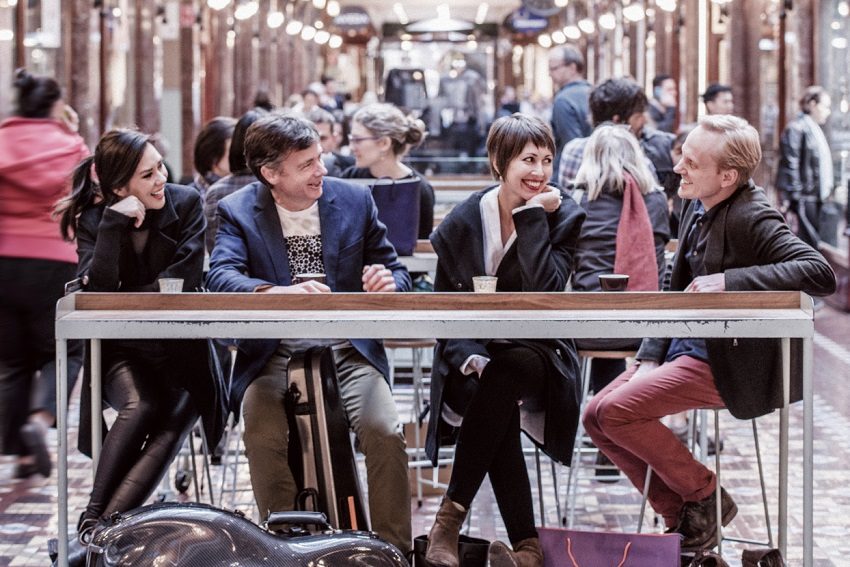The New ASQ

The ‘highly strung’ troubled days of the Australian String Quartet (ASQ) seem a distant memory as the current line-up hits its stride 18 months in.
Not for a long time has the Australian String Quartet sounded as strong and committed as it does at present. The current line-up has been together only for 18 months, that is since Dale Barltrop and Francesca Hiew started at the beginning of 2016, when they joined existing players, violist Stephen King and cellist Sharon Grigoryan (née Draper). But already the new combination appears to be working confidently together and in the same harness. The troubled days now appear to be well behind, and the group finally looks to be on a happy footing: Scott Hicks’ warts-and-all documentary, Highly Strung, is but a fading memory.
It shows where it counts: in their playing. Lately the quartet has acquired a new cohesion of sound and is playing with élan. Theirs is a wonderfully natural and effortless style compared with some former ASQ incarnations – indeed one was even tempted to think in their recent Migration concert with Slava Grigoryan that this might be the best ASQ yet (and there have been many), although it is still early days to be casting that sort of judgement.
Along with their newfound vigour, the quartet is taking on a prodigious workload. In May, they performed at the Australian Pavilion in the 2017 Venice Biennale, and later at the Kings College Centre for Australian Studies in London. These were ‘off-Broadway’, essentially in-house performances, but the players hope they will lead to fully fledged international tours to come.
“The bulk of our work is to serve the Australian community, but one of our missions we are looking at is to really build our presence internationally,” Barltrop says.
Back home they’ve been even busier, with two festival appearances this year and an ambitious range of collaborations involving the Dutch cellist Pieter Wispelwey, Melbourne-based Arcadia Winds (Musica Viva’s Future Makers ensemble), and the Melbourne Symphony Orchestra (MSO) in Matthew Hindson’s The Rave and The Nightingale. They also recorded this work with the Tasmanian Symphony Orchestra.
“It’s kept us on our toes and has been pretty relentless for the last several months,” Barltrop says. “But the music-making charges me. I thrive, we all thrive, on the exhilaration of presenting concerts.”
And the frenetic pace continues. In September they embark on their second overseas tour for the year, which sees them play with the Vancouver Symphony Orchestra in John Adams’ Absolute Jest and present a series of small concerts in Washington DC and the New York area. Then, in November, they perform the same work with the MSO, as part of the group’s residency with that orchestra this year. They have to slot in two more season concerts and ongoing residency commitments at the University of Adelaide around all this.
To further complicate matters, Barltrop is continuing in his position of co-concert-master with the MSO, which takes up 16 weeks per year. He is loved by that orchestra and they won’t let him go.
“A lot of people wondered how it would work,” he remarks. “While I’m at the MSO, of course, that does not mean the rest of the quartet is in a hiatus. They are often in Melbourne playing when I’ve got days off”.

How does he view the ASQ’s future?
“We are no longer still in a honeymoon phase, of course, but I would say that we are hitting our stride. Though we cannot rest on our laurels. We are always pushing.”
He believes the ASQ is distinctive for two reasons in a crowded world of string quartets. “The first thing is that we play on a set of Guadagnini instruments. I don’t think any other quartet has that privilege. The Tokyo [String Quartet] had Strads, but they are no more. To be playing on these gorgeous Guadagninis, thanks to the Ukaria Foundation and the wonderful vision of Ulrike Klein, is very fortunate. It gives us a distinct sound, a depth of sound. We are also champions of Australian music, of Australian composers. This is one of our missions and a big priority: to commission Australian music and take it overseas.”
As far as describing where the group is headed in terms of style and sound, Barltrop says this is “still evolving”. That is up to observers and commentators to judge, he suggests. However, he ventures that the four members’ shared experiences in AYO in their early careers is a factor in the sound they produce: “Certainly feel we bring our collective experiences to the table. It does have an effect, even if it is not highly tangible.”
One hopes the good chemistry will continue. Says Barltrop: “We are all really good friends. We all have an understanding and a trust. A level of trust has to be there, and respect for each other’s space, especially when we’re on the road. When travelling we love each other’s company, we share meals, and we always enjoy a drink or two.”
ASQ, Program 2 – Homeward
Adelaide Town Hall
Tuesday, August 15
asq.com.au
Square Circles Beneath the Sand: William Barton and the Australian String Quartet
Pacific Cultures Gallery, South Australian Museum
Thursday July 6, 6.30pm
Didjeridu Journey: Family Concert with William Barton and the Australian String Quartet
Pacific Cultures Gallery, South Australian Museum
Saturday July 8, 10.30am